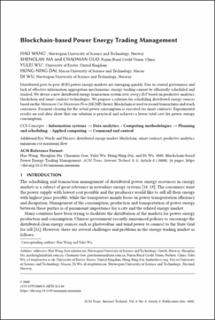| dc.contributor.author | Wang, Hao | |
| dc.contributor.author | Ma, Shenglan | |
| dc.contributor.author | Guo, Chaonian | |
| dc.contributor.author | Wu, Yulei | |
| dc.contributor.author | Dai, Hong-Ning | |
| dc.contributor.author | Wu, Di | |
| dc.date.accessioned | 2021-03-22T10:23:35Z | |
| dc.date.available | 2021-03-22T10:23:35Z | |
| dc.date.created | 2021-03-21T15:27:19Z | |
| dc.date.issued | 2021 | |
| dc.identifier.issn | 1533-5399 | |
| dc.identifier.uri | https://hdl.handle.net/11250/2734765 | |
| dc.description.abstract | Distributed peer-to-peer power energy markets are emerging quickly. Due to central governance and lack of effective information aggregation mechanisms, energy trading cannot be efficiently scheduled and tracked. We devise a new distributed energy transaction system over the energy Industrial Internet of Things based on predictive analytics, blockchain, and smart contract technologies. We propose a solution for scheduling distributed energy sources based on the Minimum Cut Maximum Flow theory. Blockchain is used to record transactions and reach consensus. Payment clearing for the actual power consumption is executed via smart contracts. Experimental results on real data show that our solution is practical and achieves a lower total cost for power energy consumption. | en_US |
| dc.language.iso | eng | en_US |
| dc.publisher | ACM | en_US |
| dc.title | Blockchain-Based Power Energy Trading Management | en_US |
| dc.type | Peer reviewed | en_US |
| dc.type | Journal article | en_US |
| dc.description.version | acceptedVersion | en_US |
| dc.source.volume | 21 | en_US |
| dc.source.journal | ACM Transactions on Internet Technology | en_US |
| dc.source.issue | 2 | en_US |
| dc.identifier.doi | 10.1145/3409771 | |
| dc.identifier.cristin | 1899685 | |
| dc.description.localcode | © ACM, 2020. This is the author's version of the work. It is posted here by permission of ACM for your personal use. Not for redistribution. The definitive version was published here, https://doi.org/10.1145/3409771 | en_US |
| cristin.ispublished | true | |
| cristin.fulltext | postprint | |
| cristin.qualitycode | 2 | |
